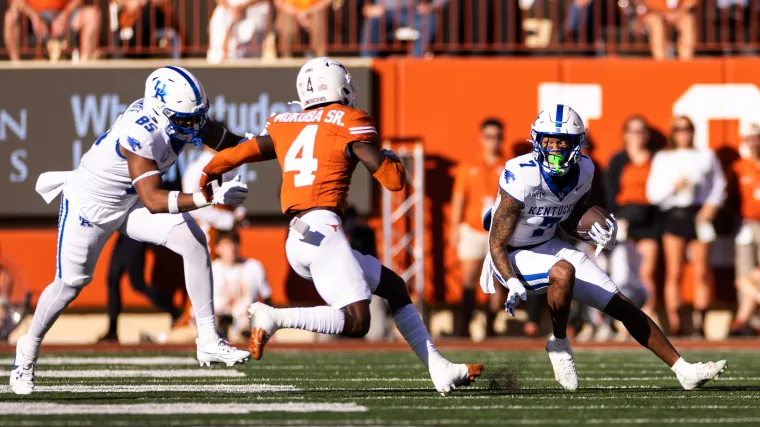bringing his dynamic playmaking abilities to Baton Rouge. This acquisition is poised to bolster LSU’s offensive arsenal, providing a formidable target for the Tigers’ starting quarterback.
Barion Brown’s Collegiate Journey
Barion Brown’s collegiate career began at the University of Kentucky, where he quickly established himself as a versatile and explosive athlete. Over three seasons with the Wildcats, Brown amassed 122 receptions for 1,528 yards and 11 touchdowns. His impact extended beyond the receiving corps; Brown also contributed 195 rushing yards with two touchdowns and excelled on special teams, setting an SEC record with five kickoff return touchdowns. Notably, during a game against Florida, he returned a kickoff 99 yards for a touchdown, highlighting his game-changing speed and vision.
The Transfer to LSU
In December 2024, Brown announced his decision to enter the transfer portal, expressing gratitude to Kentucky’s Big Blue Nation for their support during his tenure. Shortly thereafter, he committed to LSU, a move first reported by On3’s Pete Nakos. This transfer keeps Brown within the SEC, ensuring that his talents remain a prominent feature in one of college football’s most competitive conferences.
Financial Considerations and NIL Implications
The transfer was accompanied by notable financial considerations. Reports indicate that Brown received a Name, Image, and Likeness (NIL) deal valued at $750,000 to join LSU. An ACC NIL collective highlighted the escalating market for top wide receivers, noting that LSU secured a “really good value” with Brown’s acquisition. This development underscores the evolving landscape of college athletics, where NIL agreements play a significant role in player movements and team compositions.
Impact on LSU’s Offense
Brown’s arrival at LSU is expected to have an immediate and profound impact on the Tigers’ offense. His exceptional speed and agility provide a deep-threat option, stretching opposing defenses and creating opportunities for other playmakers. LSU’s starting quarterback, recognized as one of college football’s premier returning signal-callers, stands to benefit significantly from Brown’s presence. The synergy between Brown’s playmaking abilities and the quarterback’s proficiency could elevate LSU’s offensive performance to new heights.
Special Teams Enhancement
Beyond his contributions as a receiver, Brown’s prowess on special teams adds another dimension to LSU’s game plan. His record-setting five kickoff return touchdowns demonstrate his ability to change the momentum of a game instantly. Integrating Brown into LSU’s special teams unit could provide the Tigers with a strategic advantage in field position and scoring opportunities.
LSU’s Transfer Strategy
Brown’s commitment is part of a broader strategy by LSU to strengthen its roster through the transfer portal. The Tigers have also secured commitments from other notable transfers, including defensive end Patrick Payton from Florida State, cornerback Mansoor Delane from Virginia Tech, and wide receiver Nic Anderson from Oklahoma. These acquisitions reflect LSU’s proactive approach to enhancing its competitiveness within the SEC and on the national stage.
Looking Ahead
As LSU prepares for the upcoming season, the integration of Barion Brown into the team’s offensive and special teams schemes will be closely watched by analysts and fans alike. His track record suggests that he has the potential to be a game-changer for the Tigers, providing both immediate impact and long-term benefits. The collaboration between Brown and LSU’s returning quarterback could be a defining factor in the team’s pursuit of SEC dominance and national recognition.
In conclusion, Barion Brown’s transfer to LSU represents a strategic enhancement to the Tigers’ roster, with the potential to significantly influence the team’s performance in the forthcoming season. His multifaceted skill set, combined with the financial investment through NIL agreements, exemplifies the dynamic nature of modern college football and the continuous evolution of team-building strategies within the sport.



